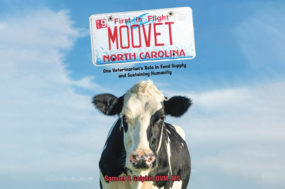As much as I hate to admit it, public confrontation makes me extremely uncomfortable. A slow waitress, an aggressive driver, a misleading store advertisement … all things that I am likely to passive-aggressively tolerate with a smile in public, while inwardly rolling my eyes and shaking my head.
While I’m certainly not shy, I tend to be a pacifist when it comes to public arguments. While this tactic is pretty good for getting me through a stressful day with minimal conflict, I am not proud of the times when my avoidance of public conflict leads me to pass up opportunities to confront the spread of misinformation about agriculture.
When I scroll through my social media feeds and see posts from my non-agricultural friends about how “factory farms” are ruining the world, I turn a blind eye. I tell myself that someone else more qualified than I will address it. Someone else will say something. I don’t want to get into an awkward or messy debate about food politics on Twitter or Facebook. As many agricultural events as I’ve attended that cover the importance of being willing to seek out these opportunities, I am 100 percent guilty of playing ostrich with my head in the sand.
The question is why. Why do I, someone with years of personal and professional experience in agriculture and degrees in agricultural education and communication, avoid opportunities to communicate? I think I’ve mostly been afraid of saying the wrong thing – it seems like every commodity group and advocacy organization has a set of talking points and resources. Sometimes it’s hard to sort through and decide what to share or link. Sometimes it’s hard to convince myself I’m qualified to enter the discussion, as I’m not a farmer or an animal scientist.
I want to call myself out, as well as all other anxious advocates for agriculture, on our desire to take the well-beaten path of avoidance. Of course it’s much more comfortable to tell my friends after the fact about something I overheard in the grocery store. It’s easier to ignore posts on Facebook or Twitter, thinking that someone else more qualified will address them. But while it may be easier in the moment, I have quite the guilty conscience for not taking every chance to speak on behalf of America’s hardworking farmers and ranchers. I’ve realized that sharing resources and personal experiences in your own words is more powerful than talking points ever will be, and there is no prequalification process for having a conversation.
While I’m not a farmer or an animal scientist, I do have a different perspective to offer on agriculture and livestock production, as I grew up a generation removed from production agriculture on a small hobby farm surrounded by encroaching development. I got my start by leasing dairy cattle to show in 4-H from a family friend and working on the farm. What could have been a childhood hobby developed into a passion for using my position as a link between the urban and rural worlds to help promote America’s farmers and ranchers and everything they do to conscientiously care for their animals.
Agricultural advocacy has come a long way since I stood in front of the milking parlor at my county fair, wearing my Dairy Maid sash and explaining the process to visitors. I can’t believe how much has changed, and will continue to change throughout my career. I’m excited to be in a role that will require me to step up every day and do what I’ve always wanted to do – be a part of the solution to the public image challenges that the agriculture industry faces.
In my new position as director of communications with the Animal Agriculture Alliance, I know I will be a little less comfortable. I will be constantly challenged. But the only way to expand your comfort zone is to live on the edge of it. PD

Hannah Thompson
Director of Communications
Animal Agriculture Alliance




